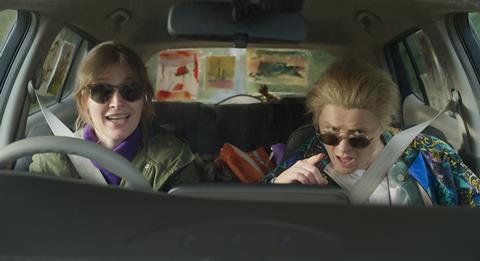Carol Morley presents a fictionalised portrait of little-known avant-garde schizophrenic artist Audrey Amiss

Dir/scr: Carol Morley. UK. 2022. 106 mins
Audrey Amiss (Monica Dolan) was formerly a secretary and is a prolific amateur artist. And according to her passport, she’s a pirate and a king. She’s also a schizophrenic, although she contests the diagnosis and prefers to refer to herself as “avant-garde and misunderstood”. Carol Morley’s gentle, meandering road movie imagines a journey in which a fictionalised version of the real Audrey (she was an unknown outsider artist) travels north, accompanied by her long-suffering psychiatric nurse (Kelly Macdonald), and reconnects with key figures and moments from her past (or at least believes that she has done so). In the moments of fizzing intensity and the blurring of reality and unreality, the storytelling reflects the idiosyncratic workings of Audrey’s mind. But there’s a disconnect between her inventive, impressionistic artistic output – Audrey’s actual work is interspersed throughout the picture – and the film’s flat, rather matter-of-fact look.
In the central role, Dolan gives an energetic and committed performance
The genesis of the film came in 2015 when Morley was awarded the Wellcome Institute Screenwriting Fellowship. This allowed her unlimited access to the Institute’s archive of science and humanities research, and the freedom to explore wherever her curiosity took her. There, she stumbled upon a cache of uncatalogued art, writing and diaries by Amiss. There’s a history of films that deal with the intersection between mental health issues and artistic output, but unlike with pictures like The Electrical Life Of Louis Wain and Seraphine, Audrey Amiss lacks the public profile which might serve as a selling point for this story. Rather, it is Morley’s name and interest in her eclectic output which will likely tempt audience, which should find further interest on the festival circuit but may struggle in the competitive theatrical market.
With her pugnacious scrubbing brush hair and her pressure cooker demeanour, Audrey is a fascinating but unpredictable character. She can see things in a way others can’t, waxing lyrical about the unexpected beauty of snack food – “see how it catches the light!” she says of a Quaver. But equally, she’s prone to paranoid delusions and believes that her upstairs neighbours are sexually interfering with her by remote control.
In the central role, Dolan gives an energetic and committed performance. Doodling, looping music in the score echoes Audrey’s exuberantly untrammelled artwork, and the pinballing impulses which drive her. Her impact on the world around her – she’s an agent of chaos certainly, but there are moments of emotionally weighted connection – is the focus of the film.
Where it is less successful is taking us into her mind. For the most part, we observe Audrey rather than experience the world from her point of view. The route to understanding the woman is through gradual revelations on her road trip – she has persuaded her nurse (named Sandra Panza, in a nod to the Quixotic nature of adventure) to drive her from London back to her hometown of Sunderland, where she hopes that a local gallery will stage an exhibition of her work. A degree of closure comes with an encounter with an estranged sister (Gina McKee). But, like Sandra’s yellow hatchback (nicknamed Sunshine), the film chugs along a little aimlessly before finally running out of fuel.
Production company: Cannon and Morley Productions (CAMP)
International sales: Metro International Entertainment Limited sales@metro-films.com
Producers: Cairo Cannon, Ameenah Ayub Allen
Cinematography: Agnès Godard
Production design: Janey Levick
Editing: Alex Mackie
Music: Carly Paradis
Main cast: Monica Dolan, Kelly Macdonald, Gina McKee, Kieran Bew, Christine Bottomley, Judith Chandler























